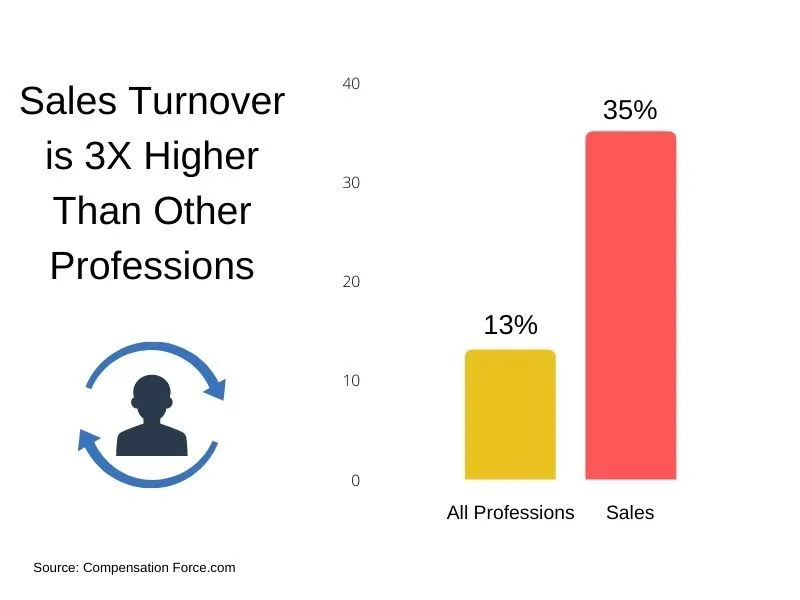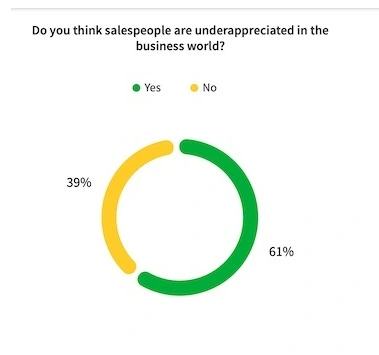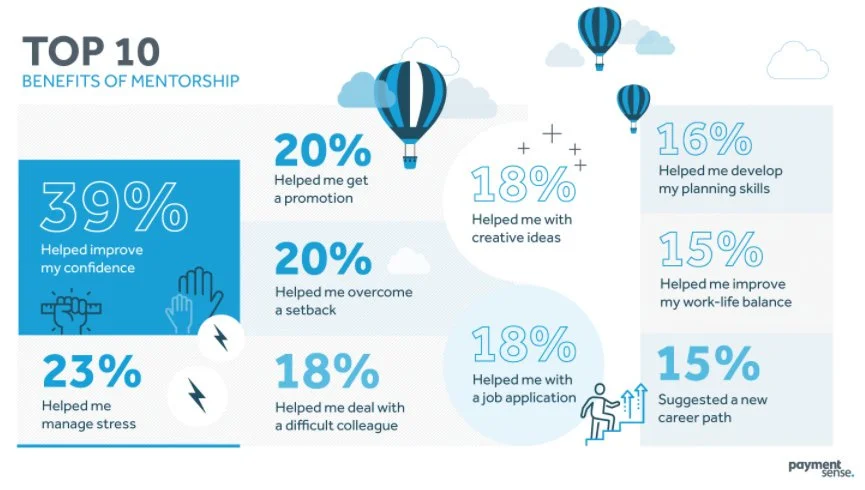How to Improve Sales Culture to Increase Sales Revenue
Sales culture matters to your sales results — perhaps more than anything else you do.
You can offer your sales team great pay, incentives, and benefits, but if your company doesn’t provide a positive work environment, you’ll still experience high turnover and poor employee retention rates.
Speaking from first-hand experience, working in a negative sales culture can feel a lot like being in prison – figuratively chained to your desk with strict managers hounding you every 5 seconds to “smile and dial!”
In the wrong type of company culture, sales can be a thankless job where you’re overexerting yourself day after day to meet your KPIs, with no light at the end of the tunnel.
But for companies that work to perpetuate a positive culture, sales can be a rewarding job with huge financial rewards (for both your employees and your company).
Creating a positive sales culture is not just a nice thing to do. It’s a necessary endeavor that will impact your bottom line tremendously. After all, it takes happy, loyal employees to acquire and maintain happy, loyal customers.
Full disclosure:
In case you were unaware, I do actually work in a prison. Televerde operates five of its nine call centers within the Department of Corrections in Arizona and Indiana. If we can find ways to foster a positive sales culture of personal growth and upward mobility — trust me, you can too.
If you are so inclined, go read more about our business model and the amazing results we deliver here. However, this article is not about us, it’s about you, and the steps you can take to improve your sales culture to increase revenue.
Quick Takeaways
- Culture matters most in sales, which experiences an alarming 3X higher turnover than other professions.
- More than 60% of sales reps say they feel like their role is underappreciated. A positive sales culture can change that.
- Sales leaders don’t have to offer fully remote work environments to win new talent. In fact, employees want in-person collaboration with built-in hybrid flexibility.
- Sales mentorship programs build employee confidence and help them succeed more.
- Professional advancement should be decided by merit, not by seniority alone (or worse, manager preference).
More on Why Sales Culture Matters
Sales teams are in a unique position. They’re often on the front lines of customer interactions, so it’s fair to say that happy, satisfied sales reps will translate to better customer experiences and increased employee retention.
But sales teams have notoriously high turnover rates — up to 3X higher than other professions — which can have devastating effects on your bottom line.

To boot, replacing a sales team member costs an average of 200% of their annual salary and benefits. While company culture is important, a positive sales culture is absolutely crucial for revenue growth.
So — how do you want your company to be perceived by prospects and customers? How does culture impact revenue? What steps do you need to take to create and maintain a positive sales culture?
Funny you should ask, because I’m about to walk you through the six essential elements of a positive sales culture – with steps you can take to start improving yours today.
Six Essential Elements of a Positive Sales Culture
Effective leadership
Leadership changes, policy changes, and company growing pains can all adversely affect your sales culture. Like all organizations, these are challenges we are dealing with constantly at Televerde. But in the face of uncertainty, we are taking a proactive approach to maintaining a positive sales culture.
One of our newer managers makes it a habit to do side-by-side sales coaching, and is not afraid to hop on a call himself. Effective leaders dive into the trenches with us to show, not tell.
When external leadership is brought onto the sales team, this will inevitably cause push-back from employees who reminisce on the “good old days.” After all, it’s easier to love what you know. That’s why, from the perspective of the sales team, it’s ideal for new leaders to sit back for a couple weeks, evaluate the current processes, then make plans to improve them.
When they do, it should be with the help and input of the existing sales team. Then, finally, they can take charge and implement changes with confidence.
Changes with the company as a whole can also cause pushback that can negatively affect sales culture, as products, policies, and procedures are constantly evolving. Transparency during change is key, and regular meetings to discuss changes allows everyone on your sales team to feel heard.
Finally, it’s no secret that sales is a tough job; and in speaking with many of my colleagues, I’ve uncovered that sales people often feel underappreciated. Research backs this up — 61% of sales reps believe their role is underappreciated in the business world at large.

As a leader, don’t forget to ask your sales team what they need from you as a leader, and when you do ask for feedback, listen. Take their ideas and opinions into consideration — doing so will prove to your sales team that you truly value and appreciate them.
Professional development
Paychecks notwithstanding, training is the most valuable thing you can offer your employees.
Like many things in life, when it comes to your sales team, you get out what you put in. The investment you make into your sales team’s professional development will go a long way towards improving performance, morale, and culture. The good news? Recent research found that 86% of current workers want more opportunities to enhance current skills.
For sales, this can be training on best practices, technology, sales techniques, or even things like psychology and wellness. One of the most effective trainings I’ve gone through was centered on applying sales techniques to basic human psychology.
Sales coaching and product training are vital to sustaining a culture of learning and development. Sales people are an especially gritty bunch – and they love a challenge. What type of challenging training or hands-on experience are you offering your sales team that no one else can?
Strengthening your employee base will strengthen your company in more ways than one — through increased sales, retention, and customer satisfaction.
Stronger as a team
Take a minute to consider your sales team’s ability to actually work as a team. Do they build each other up? Are they competitive in a healthy way? Do they share their secrets to success with each other?
As Aristotle said: “The whole is greater than the sum of its parts.”
Sales teams across all industries are rife with cultural issues, as employees are often fiercely competitive and secretive. When your sales team instead directs that shark-like ferocity towards outperforming your competitors — and actually working as a team — magic can happen.
After reading Angela Duckworth’s Grit: The Power of Perseverance, I’m convinced that hard work trumps talent any day. With the right amount of encouragement, motivation, and determination, a new sales team member can go from shark-bait to Great White.
Do you have the type of culture in place to nurture this type of growth? Your team should be lifting each other up when someone is struggling, helping one another to reach their full potential.
How do you put these ideas into practice? Enter: Mentorship.
Systemic peer-to-peer mentorship programs are beneficial for all parties involved; and they can create a family-like (and performance-oriented) atmosphere overnight. It’s imperative that companies understand how to effectively execute mentorship programs when trying to recruit and retain top sales talent.
At Televerde, we have strong sales leaders and mentors that provide coaching and lead the way for new sales team members. Our mentors know that both positive and constructive feedback are equally instrumental in helping each other thrive.
Mentorship programs are gaining momentum in the corporate world — and the benefits are powerful. Mentorship helps employees improve their confidence, overcome setbacks, be more creative, earn promotions, better handle interpersonal relationships at work, and more.

Values & Respect
Organizations frequently espouse values like respect, integrity, and tenacity, all related to delighting customers and developing employees. But when it comes to actually living these stated values, many companies fall short — and this is especially true within sales culture.
According to a recent Sirius Decisions Brief, training and resources all-too-often encourage behaviors that are “clearly inconsistent with the organization’s values.” One example they include is how “companies may claim they value the voice of the customer, yet they train their [sales team] in combative objection-handling techniques.”
This disregard for values and integrity contributes to a negative sales culture.
Speaking of living your stated values, let’s talk about respect. Ask any sales rep (or any employee for that matter) what matters to them most – and “respect” often tops the list. Yet, recent headlines have shone light on the blatant disrespect and uncivil behavior happening in the workplace.
I recently came across an article in Harvard Business Review featuring Televerde that discussed the issue of declining workplace respect. It stated that there are two types of respect in an organization:
- Owed respect, which is “accorded equally to all members of a work group or organization. It’s signaled by civility and an atmosphere suggesting that every member is inherently valuable.”
- Earned respect, which “recognizes individual employees who display valued qualities or behaviors.” (not simply manager preference or seniority).
Stress relief
Salespeople face a ton of rejection. In fact, they pretty much get rejected for a living; as maybe one out of every 100 marketing qualified leads (MQLs) will actually convert, according to Sirius Decisions.
We’re all human, and mass amounts of rejection can wear even the most thick-skinned sales rep down to the bone. That being said, make sure to break up the monotony with some break-time.
Give your sales team room to blow off some steam! Companies across the world have recently added things like game rooms with foosball and pool tables, or team outings (nature hikes, yoga classes, walks around the city, etc.).
My favorite example of this concept is how certain organizations are practicing a “bring your pet to work” policy (I just love this!). A hard day at work would be so much better if there were puppies involved.
On a daily basis, we have team ‘hype-sessions’; and on Friday, dance-offs (which are super fun to watch if you don’t want to participate). With purpose being at the core of our business model, Televerde also offers paid time off for volunteering. Setting aside time to relax and refresh will work to increase performance and promote team-bonding.
More than ever, offering flexible work environments that include remote and/or hybrid work days is imperative to recruiting and keeping top sales talent. Nearly three-quarters of employees say they want the remote/hybrid work models implemented during the pandemic to stick around, and thankfully the majority of organizations (66%) are redesigning their work models to allow it.
Of note — this doesn’t mean employees don’t want in-person work. In fact, 67% say they want more in-person collaboration. It’s all about providing the right sales culture to foster it.

The takeaway: Giving your sales team some work/life balance shows your employees that you care about them and value their wellness.
Meritocracy for advancement
Speaking from experience, managers playing favorites and watching people advance unfairly through the ranks perpetuates a hostile work environment and can demotivate your entire sales team. Don’t be that guy.
With sales culture being so clearly tied to sales agent performance, a meritocracy is the only way to go. May the best man (or woman) win — and the ‘best man’ needs to be determined through objective means, like numbers and results.
Imagine you’re an inside sales rep, with your eye on the prize of becoming an AE (account executive). You work your booty off, crush your KPI goals, and push yourself ridiculously hard to become a top performer.
But Kathy, who sits two cubicles away and has mediocre metrics and a habit for tardiness gets chosen for the AE job, because she is BFFs with your manager.
How would you feel? Undervalued, maybe?
It’s important to treat all employees fairly and not give into the basic human nature of playing favorites. Give all your employees an equal opportunity to succeed. And when they do well, reward them based on their tangible achievements.
Sales Culture = Crucial
Your sales team is the lifeblood of your organization; and the culture of your sales team can absolutely make or break your company.
Harvard Business School’s Clayton Christensen discovered that every decade, almost 50% of Fortune 500 companies cease to exist.
According to would-be investors, a healthy sales culture is the best indicator of a company’s long-term success. Are you doing everything in your power to strengthen yours?
Televerde has been generating demand and accelerating sales for companies like SAP and Marketo for 25 years; all while helping thousands of disempowered women to achieve success.
Interested in learning more about us and the amazing results we deliver? Contact us today to learn how we can help you achieve your sales goals.


